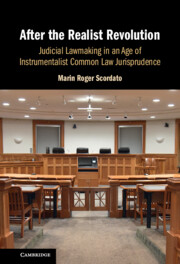 After the Realist Revolution
After the Realist Revolution Published online by Cambridge University Press: 02 May 2025
This chapter analyses the consequences of the paradigm shift from formalism to instrumentalism on the activity of legal scholarship. Under a traditional formalist conception, the activity of appellate courts in making and developing common law and the activity of legal scholars studying and writing about that lawmaking activity are in close harmony. The unifying feature of both endeavors is a mastery and an application of traditional formalist legal analysis. Both courts and legal scholars are focused on the process of deductively applying identified first principles to novel legal issues as a way of determining logically required resolutions of those issues. They are also both involved in the process of refining an established body of common law to accommodate new factual disputes as they arise and to incorporate the preferred resolution of novel issues.
The shift from formalism to instrumentalism profoundly disrupted this harmonious synergy. Much in the same way that the intellectual work of appellate courts changes fundamentally under instrumentalism, so too does the professional posture and responsibilities of legal scholars.
This chapter offers a comprehensive account of modern legal scholarship in the current instrumentalist era.
To save this book to your Kindle, first ensure [email protected] is added to your Approved Personal Document E-mail List under your Personal Document Settings on the Manage Your Content and Devices page of your Amazon account. Then enter the ‘name’ part of your Kindle email address below. Find out more about saving to your Kindle.
Note you can select to save to either the @free.kindle.com or @kindle.com variations. ‘@free.kindle.com’ emails are free but can only be saved to your device when it is connected to wi-fi. ‘@kindle.com’ emails can be delivered even when you are not connected to wi-fi, but note that service fees apply.
Find out more about the Kindle Personal Document Service.
To save content items to your account, please confirm that you agree to abide by our usage policies. If this is the first time you use this feature, you will be asked to authorise Cambridge Core to connect with your account. Find out more about saving content to Dropbox.
To save content items to your account, please confirm that you agree to abide by our usage policies. If this is the first time you use this feature, you will be asked to authorise Cambridge Core to connect with your account. Find out more about saving content to Google Drive.